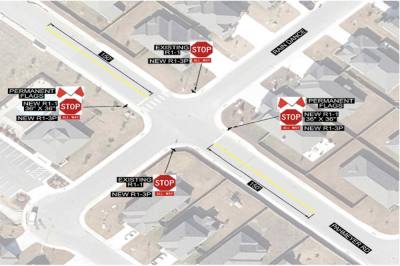Pahmeyer Road and Rain Dance have a speed limit of 30 mph and are residential streets, with two stop signs already in place in the intersection on Rain Dance.
“We have to do everything we can to make it as conspicuous and visible as possible,” said Garry Ford, transportation and capital improvements director. “So we are recommending stop lines a double yellow center line even a crosswalk marking with oversized stop signs.”
Many residents of the neighborhood spoke their concerns for the safety of the intersection, which is adjacent to a school bus stop, a neighborhood cluster mailbox and the neighborhood's amenity center.
“If there's a stop sign, it will at least cause [drivers] to be braking, [and] come to a stop in that high-traffic area for children to cross to get the amenities center or get off the bus or wait for the bus,” said Rachel Owens, a resident in the neighborhood.
New Braunfels city staff did not recommend an all-way stop at the intersection because it did not meet the Texas Manual on Uniform Traffic Control Devices criteria. The MUTCD defines the standards used by road managers nationwide to install and maintain traffic control devices on all public streets, highways, bikeways and private roads open to public travel, according to the U.S. Department of Transportation.
After receiving input from concerned parents and members of the neighborhood, the New Braunfels City Council voted to approve the first reading 5-2 for an all-way stop at the Nov. 14 meeting. Ultimately, council approved the placement of two stop signs on Pahmeyer with crosswalks and lane striping with a unanimous vote during their Nov. 29 City Council meeting.
“My goal of supporting this is to allow people to move safely across the intersection to the amenity center and go back and forth,” said Harry Bowers, council member of District 3 and mayor pro tem. “If it slows down some people that's great, but... my goal was purely to help people get across that without having to judge the speed of a car.”
The project is anticipated to cost around $3,000 and will be completed in a few months after a bid for the projects is received.






